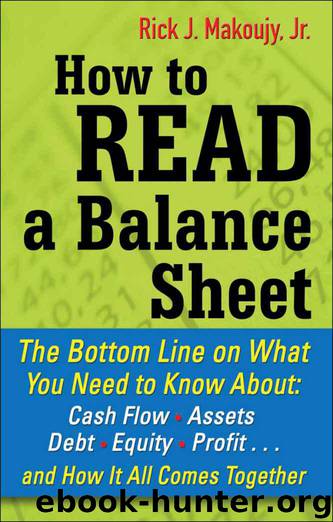How to Read a Balance Sheet : The Bottom Line on What You Need to Know about Cash Flow, Assets, Debt, Equity, Profit...and How It all Comes Together by Rick Makoujy

Author:Rick Makoujy [Makoujy, Rick]
Language: eng
Format: mobi
Publisher: McGraw-Hill
Published: 2010-04-18T14:00:00+00:00
Companies that seek to raise cash but have dubious credit or short operating histories often employ sale leaseback transactions to secure required capital. A sale leaseback is simply the process of selling a long-term asset like equipment to an investor. The monies received by the business from the sale, net of any preexisting secured debt on the asset, are pocketed for working capital needs. The asset—in this case, the equipment—is no longer owned by the company. The business then rents, or leases, the equipment back from the purchaser. Sale leasebacks generally require that the business seeking capital pay a high rate of return (sometimes exceeding 20 percent) to compensate the investor for the increased risk of default. Unlike the extension of a secured loan, the transfer of title of the asset is required to avoid a foreclosure process should a default occur. Sometimes the business retains the ability to repurchase the asset from the investor once the lease payments are made or at any time for a premium to the investor’s purchase price.
Sale leasebacks are often an indication that a company is struggling financially. Instead of lending the cash to the business, the investor requires immediate ownership of the asset effectively being financed. Should the company file for bankruptcy, the investor generally maintains ownership of the asset. (There are exceptions if the asset is sold at a discount to its true value shortly prior to such a filing.) Keep an eye out for companies that employ this strategy—it is often considered a last resort. Be careful when considering extending unsecured payment terms to businesses in this condition.
NET PRESENT VALUE
Download
This site does not store any files on its server. We only index and link to content provided by other sites. Please contact the content providers to delete copyright contents if any and email us, we'll remove relevant links or contents immediately.
Zero to IPO: Over $1 Trillion of Actionable Advice from the World's Most Successful Entrepreneurs by Frederic Kerrest(4529)
Machine Learning at Scale with H2O by Gregory Keys | David Whiting(4296)
Never by Ken Follett(3937)
Harry Potter and the Goblet Of Fire by J.K. Rowling(3848)
Ogilvy on Advertising by David Ogilvy(3609)
Shadow of Night by Deborah Harkness(3361)
The Man Who Died Twice by Richard Osman(3073)
Book of Life by Deborah Harkness(2934)
The Tipping Point by Malcolm Gladwell(2914)
Will by Will Smith(2911)
0041152001443424520 .pdf by Unknown(2843)
Purple Hibiscus by Chimamanda Ngozi Adichie(2828)
My Brilliant Friend by Elena Ferrante(2824)
How Proust Can Change Your Life by Alain De Botton(2808)
How to Pay Zero Taxes, 2018 by Jeff A. Schnepper(2646)
Hooked: A Dark, Contemporary Romance (Never After Series) by Emily McIntire(2551)
Rationality by Steven Pinker(2352)
Can't Hurt Me: Master Your Mind and Defy the Odds - Clean Edition by David Goggins(2324)
Borders by unknow(2304)
